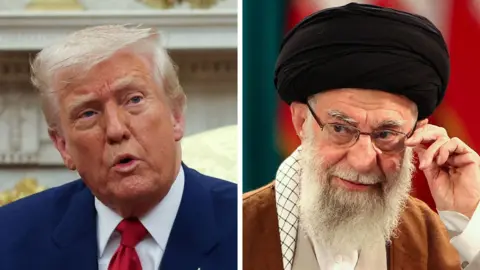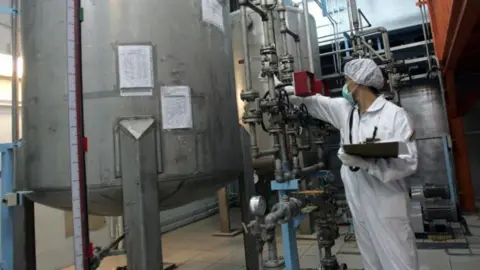Can Trump convince Iran to ditch its nuclear programme?
 Reuters / Getty Images
Reuters / Getty ImagesDonald Trump is a man in a hurry.
In the few short months he has been in office, the US president has sought and failed to bring peace to Gaza and Ukraine. He has bombed Yemen. He has launched a global trade war. Now he is turning his attention to Iran.
This has always been on the president's jobs list. For Trump, Iran is unfinished business from his first term.
The issue remains the same as it was then: what can stop Iran seeking a nuclear weapon?
Iran denies it has any such ambition. But other countries believe the Islamic republic wants at the very least the capacity to build a nuclear warhead, a desire that some fear could spark an arms race or even all-out war in the Middle East.
In 2015, Iran agreed a deal with the US, UK, France, Germany, Russia and China. It was called the Joint Comprehensive Plan of Action (JCPOA).
Under its provisions, Iran would limit its nuclear ambitions - and allow in international inspectors - in return for getting economic sanctions lifted.
But Trump pulled the US out of the deal in 2018, claiming it rewarded terrorism by funding Iran's proxy militias such as Hamas and Hezbollah. The US reimposed sanctions.
Iran subsequently ignored some of the deal's restrictions and enriched more and more uranium nuclear fuel.
Analysts fear Iran could soon have enough weapons-grade uranium to make a nuclear warhead.
The International Atomic Energy Agency (IAEA) watchdog estimates Iran's stockpile of 60% enriched uranium could make about six bombs if it was enriched to the next and final level.
Within days of his inauguration, Trump restored his former policy of so-called "maximum pressure" on Iran.
On 4 February, with his trademark fat felt-tip pen, he signed a memorandum ordering the US Treasury to impose further sanctions on Iran and punish countries violating existing sanctions, especially those buying Iranian oil.
Now the White House is hoping to match that economic pressure with diplomacy.
Last month, Trump sent a letter to Iran's Supreme Leader, Ali Khamenei.
The president offered to begin negotiations and sought a deal within a couple of months.
Now he has agreed to direct discussions between US and Iranian officials in Oman at the weekend.
The US threat to Iran is explicit: agree a deal or face military action.
"If the talks aren't successful with Iran, I think Iran is going to be in great danger," Trump said on Monday.
 Getty Images
Getty ImagesSo how might Iran respond?
Some policymakers in Tehran appear keen to agree a deal that could get sanctions lifted.
Iran's economy is in dire straits, with soaring inflation and a plunging currency.
But any such deal might involve compromises some hardliners could find hard to stomach.
Iran has suffered huge reverses in recent months, seeing its proxy militias severely weakened by war with Israel and its regional ally, President Bashar al-Assad of Syria, ousted. Some in Tehran argue now may be exactly the time to build a nuclear deterrent.
Both the US and Iran seem far apart. Their negotiating positions are not explicit.
But the US has made clear it wants the full dismantlement of Iran's nuclear programme, including a complete end to any further uranium enrichment, plus no further support for Hezbollah in Lebanon and the Houthis in Yemen.
That might prove too much for Iran to accept.
A complete ban on any nuclear enrichment - even for civilian purposes - has long been seen as an absolute red line for Tehran.
There is also the problem of Iranian technological expertise: its scientists simply know more now about how to make a nuclear weapon than they did 10 years ago.
As for Israel, it has made clear it would accept only the complete end to any Iranian nuclear capability. Prime Minister Benjamin Netanyahu says he would agree to "the way it was done in Libya".
This is a reference to the decision by late Libyan leader Muammar Gaddafi to dismantle his entire nuclear programme in 2003 in return for getting sanctions lifted.
But Iran is unlikely to follow this precedent.
What if talks fail?
Israel has long considered military options to try to destroy Iran's nuclear capabilities. But many are buried deep in underground bunkers.
Military analysts say Israel would need not just US help to bomb Iran, it might also need special forces on the ground to guarantee the destruction of its nuclear facilities.
This means military action would be risky and its success by no means guaranteed.
Trump also came to office promising not to start any more so-called "forever wars", and an all-out regional conflict involving Iran could become one of those.
That has not stopped the US president from reportedly giving Israel more air defences and deploying more long-range B2 bombers to the region.
So, for now, Trump seems to be looking for a diplomatic solution - one Israel might have to accept as a fait accompli, regardless of its provisions.
But if there is no agreement, he is reserving the right to use force, the consequences of which could be devastating.
In the meantime, the president is allowing two months for both sides to agree a deal.
He may have forgotten it took negotiators two years to agree the JCPOA. Rushed diplomacy is not always successful diplomacy.
